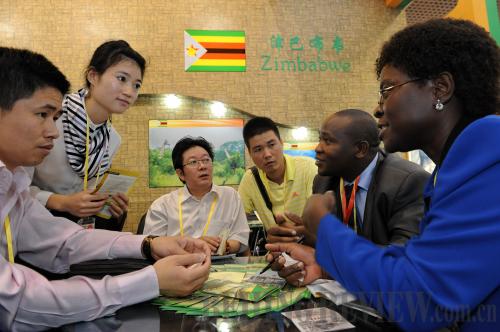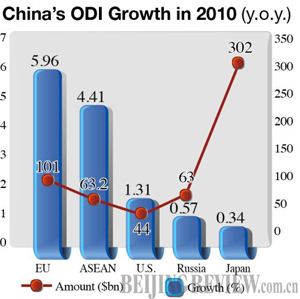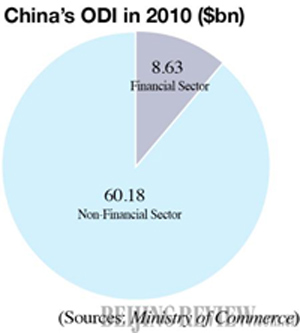 |
|
FISHING TRIP: Zimbabweans explain the country's investment policies to Chinese business people at the 15th China International Fair for Investment and Trade in Xiamen, Fujian Province (ZHANG GUOJUN) |
Decade in the WTO
China's rapid economic growth as well as its outbound investment hasn't been achieved overnight. China's entry into the WTO a decade ago has given the country a strong boost.
"China's accession to the WTO has greatly helped my company in its process of going global," Dong Haiyang, Vice President of Beijing-based BAIC Motor Corp. Ltd., told Beijing Review. It has helped increase mutual trust between Chinese companies and their international partners in business negotiations and other issues such as solving disputes and arbitration clauses, said Dong. "Because we can play under the same rules," he said.
In December 2009, BAIC signed an agreement with automaker SAAB and acquired three vehicle development platforms, related technologies and the intellectual property rights of two series of turbo-charged engines from the Sweden-based vehicle company, a milestone in the company's overseas investment.
"I am glad to see that during the decade after China entered the WTO, China and its international partners have achieved win-win development in the areas of international trade, foreign direct investment (FDI) and outbound direct investment (ODI)," said Chen Deming, Minister of Commerce at the 2011 International Investment Forum held under the framework of the CIFIT to commemorate the 10th anniversary of China's accession to the WTO.
Statistics from the MOFCOM show that China utilized $114.7 billion of FDI in 2010, a great leap forward compared with $46.9 billion in 2001.
In addition to attracting FDI, the past decade also witnessed growth in China's investment in overseas market. In the early years after China entered the WTO, its ODI was no more than several billion dollars a year. However, last year, the number surged up to $68.81 billion, making China the fifth largest international investor.
Of course, joining the WTO not only brings China great opportunities by allowing Chinese enterprises to do business with their international partners on an equal footing, but also means obligations and challenges.
According to Chen, so far, China has opened its markets to foreign investors in more than 100 service sectors and nearly all the manufacturing sectors, the same level as some developed countries. MOFCOM statistics show that service sectors have utilized 46 percent of China's total FDI. China is now the world's second largest service outsourcing destination.
"In the process of attracting FDI, China has gone through a bumpy development road," said Chen. To improve its investment environment, China has formulated a series of laws and regulations, focusing on protecting intellectual property rights and cracking down on fake and low-quality goods.
Despite these efforts, China is still a major target of trade protectionism. Especially during the current stage when some countries are suffering from the global financial crisis and sovereign debt crises, trade and investment protectionism in some countries is on the rise.
"During the process of going global, Chinese enterprises have been supported by most countries," said Chen. "However, there are some countries that do not welcome foreign investment and some large economies exclude China's investments under the name of national security."
On September 5 2011, the WTO Appellate Body ruled in favor of the U.S. decision to impose punitive duties of 35 percent against Chinese tire imports, quoting damages to its own tire industry. MOFCOM expressed its regret. In early 2011, Huawei Technologies Co., a leading global information and communications technology solutions provider of China, called off its bid to take over 3Leaf Systems, a computer firm of the United States, due to the heavy pressure from the Committee on Foreign Investment in the United States.
"These practices cannot help our joint efforts of coping with the financial crisis," said Chen, adding that the world should maintain an environment to liberalize trade and facilitate investment for all countries to cope with the challenges of the global financial crisis.
(Reporting from Xiamen)

 | 